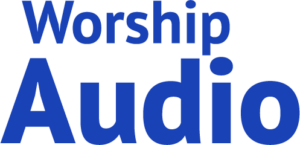As more and more churches begin streaming services online, issues related to copyright are on the rise. As you may already know, copyright issues can make or break a Sunday morning service live stream. Your church’s stream can suddenly be muted or stopped from streaming on Facebook, YouTube, or another streaming platform. Understanding copyright issues and how to navigate them are essential as your church begins to stream more content online.

The purpose of this article is to help your church understand the nature of copyright issues and help you know what to do when you’re facing a copyright issue.
TWO TYPES OF COPYRIGHT

Copyright refers to the legal control a company or individual has over their written or performed content. Copyright law protects artists against other artists using or making money off their music/lyrics without their knowledge or permission. Copyright can extend to music in two different ways.
1. Original Recording- The original recording of most songs is under copyright. This means a church playing or streaming popular music before, during, or after a Sunday service can be guilty of copyright infringement. This copyright issue concerns pre-recorded music.
2. Lyrics and Music Composition- The actual lyrics and musical composition of a song can also fall under copyright. This means an individual playing their own personal interpretation of a popular song could still be guilty of issues related to copyright. This issue usually concerns live music.
COPYRIGHT AND YOUTUBE

YouTube has an automatic Content ID system. This ID system automatically claims content and links it with the content owner. Copyright can be found anywhere. The ID system could flag a short song played before your service, a video clip played during the sermon, or even live worship, as infringing on copyright.
If the YouTube Content ID system claims content, YouTube may automatically show ads on your video in order to share revenue with the content publisher. You may also receive an email from YouTube explaining that your video has been copyright claimed. This means your video has music/sound somewhere that has been matched in the YouTube system as belonging to someone else.

Receiving an email regarding copyright-claimed content may not require action. YouTube may simply be letting you know that your content includes copyright-claimed music.
If you’d like to respond to copyrighted-claimed content, you’ll be offered a few different options:
- Mute the video sound
- Mute the specific song
- Replace the song
- Trim out the claimed content.
When your content is matched with published content, the publisher of that content is notified. The publisher may choose to do nothing, ask YouTube to mute your video, decide to run ads on your video or even ask YouTube to issue a takedown notice. If your video is the subject of a takedown notice by the publisher, you’ll be given a “strike”. Strikes will expire after 90 days. However, if your account receives 3 strikes within a 90-day period your account will be turned off and the videos will be removed from YouTube. Obviously, you don’t want to earn 3 strikes on YouTube due to copyright violations by your church.

COPYRIGHT AND FACEBOOK
Facebook has its own Content ID system. In Facebook, the owner/publisher of content has the ability to sign up and claim the rights to their content through the Facebook Rights Manager program. Publishers claiming the rights to their content help Facebook’s Content ID system identify copyright-claimed content.

Copyright-claimed content on Facebook may be muted until the issue is resolved. The user will receive a notification letting them know their video was partially muted. Facebook explains that users will then have an opportunity to respond to the claim. If you don’t have the appropriate license to show muted content, you have a few different choices:
- Cut out the copyright-claimed content and re-upload your video
- Keep the video muted
- Delete the video from Facebook
If you do have the appropriate license for your content you have the ability to dispute the copyright claim in order to restore your video’s sound.
CCLI LICENSE FOR CHURCH STREAMING
Churches can purchase licensing which will allow them to use the published content in many ways within the bounds of the law from CCLI. A CCLI Copyright License allows churches to:
- Store Lyrics
- Print Songs
- Record Services
- Make Custom Arrangements
- Project Lyrics
- Translate Songs into Other Languages.
The CCLI Copyright License Manual offers more details regarding what’s allowed under this license. It’s important to note this license does not allow for streaming content. A separate Streaming License is necessary if you plan on streaming or publicly sharing your recorded services.
STREAMING LICENSE
Adding on the Streaming License allows your church to stream, re-stream, distribute electronically participating songs from your website or streaming platform. It’s important to note not all songs are covered by this license (find out if a song is covered). Churches should also note that this license does not allow churches to stream the original artist or record label recordings of songs.
PUBLIC DOMAIN MUSIC

Some worship songs are free to use in the public domain and not covered by copyright. However, later recordings of the song may be under copyright and cause your church’s use of the song to be flagged for copyright violation. If this happens, confirm that your song is free to use in the public domain and then dispute the claim.


